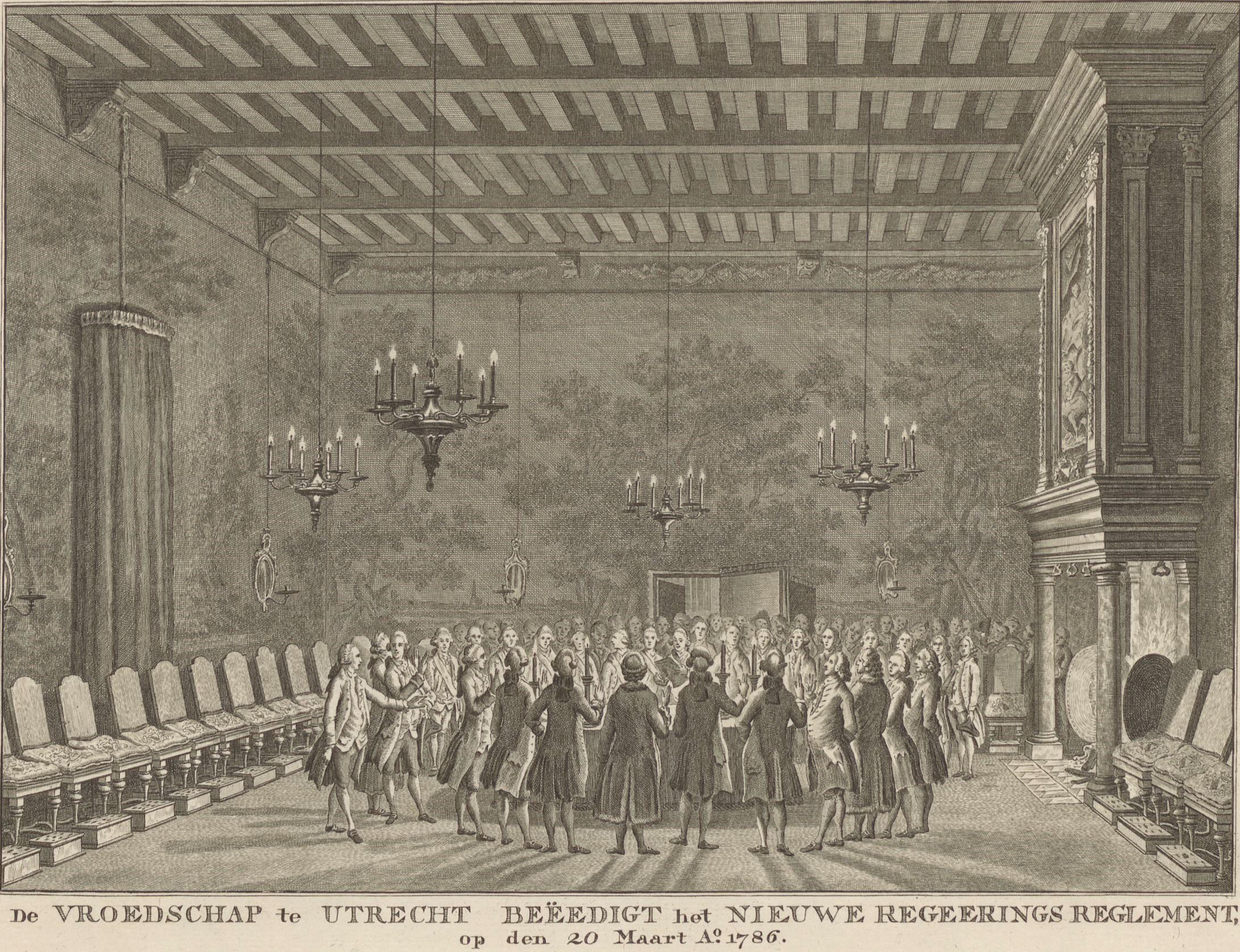Vroedschap on:
[Wikipedia]
[Google]
[Amazon]
 The ''vroedschap'' () was the name for the (all male)
The ''vroedschap'' () was the name for the (all male)
 The ''vroedschap'' () was the name for the (all male)
The ''vroedschap'' () was the name for the (all male) city council
A municipal council is the legislative body of a municipality or local government area. Depending on the location and classification of the municipality it may be known as a city council, town council, town board, community council, borough counc ...
in the early modern
The early modern period is a Periodization, historical period that is defined either as part of or as immediately preceding the modern period, with divisions based primarily on the history of Europe and the broader concept of modernity. There i ...
Netherlands
, Terminology of the Low Countries, informally Holland, is a country in Northwestern Europe, with Caribbean Netherlands, overseas territories in the Caribbean. It is the largest of the four constituent countries of the Kingdom of the Nether ...
; the member of such a council was called a ''vroedman'', literally a "wise man". An honorific title of the ''vroedschap'' was the ''vroede vaderen'', the "wise fathers"
Most early modern Dutch cities were ruled by a government of male burghers or '' poorters'' (bourgeois) who were members of the regent class, the ruling elite. During late Medieval times, the regents had in all cities gradually managed to exclude men of the artisan class from membership, making themselves a sort of hereditary city nobility. In the Dutch Republic
The United Provinces of the Netherlands, commonly referred to in historiography as the Dutch Republic, was a confederation that existed from 1579 until the Batavian Revolution in 1795. It was a predecessor state of the present-day Netherlands ...
, a city administration consisted of the magistrate and the ''vroedschap''. The magistrate (or city government) consisted of a number, often four, of burgomaster
Burgomaster (alternatively spelled burgermeister, ) is the English form of various terms in or derived from Germanic languages for the chief magistrate or executive of a city or town. The name in English was derived from the Dutch .
In so ...
s assisted by a number of aldermen (''schepenen A schepen (Dutch, ; . ') or échevin (French, , ) or Schöffe (German, ) is a municipal officer in Belgium and formerly the Netherlands, where it has been replaced by the (a municipal executive).
In modern Belgium, the ''schepen'' or ''échevin'' ...
''), and looked after the daily administration of the city. In most cities, the mayors were chosen for a period of four years. The previous (and usually the youngest) mayor was responsible for the ''schutterij
Schutterij () refers to a voluntary city guard or citizen militia in the medieval and early modern Netherlands, intended to protect the town or city from attack and act in case of revolt or fire. Their training grounds were often on open spaces w ...
'', the civil militia. The ''vroedschap'' appointed the magistrate, mostly from its own ranks; sometimes other members of the regent class were proposed. There was a complicated system of drawing lots and in many cities a shortlist was made from which the ''stadtholder
In the Low Countries, a stadtholder ( ) was a steward, first appointed as a medieval official and ultimately functioning as a national leader. The ''stadtholder'' was the replacement of the duke or count of a province during the Burgundian and ...
'', the highest provincial executive official, could choose; from 1748 this became a general system for the Dutch Republic.
The ''vroedschap'' was convened on financial questions, sometimes on national politics, and always for elections for the appointment of important local posts, such as governor appointments for institutions like the poor house, orphanage, and almshouses. The vroedschap thus served the economic interests in which its members had an important share. In contrast to magistrates, ''vroedschapsleden'' ("members of the city council") were appointed for life. The council consisted of ten to forty citizens, that met weekly or less often. They chose one or two new mayors and representatives to the Provincial States in January each year.
Membership was based on ''uitverkiezing'' ( cooptation) and inheritance. Family ties were important, as were good breeding and social status in the community. ''Vroedmannen'' had to satisfy three basic conditions: male, membership of the Calvinist church and ownership of a house. Although city administrations, by present standards, were more oligarchic
Oligarchy (; ) is a form of government in which power rests with a small number of people. Members of this group, called oligarchs, generally hold usually hard, but sometimes soft power through nobility, fame, wealth, or education; or throug ...
than meritocratic
Meritocracy (''merit'', from Latin , and ''-cracy'', from Ancient Greek 'strength, power') is the notion of a political system in which economic goods or political power are vested in individual people based on ability and talent, rather than ...
, family ties never formed a formal legal basis for election.
In times of crisis, the ''stadholder'' sometimes appointed new ''vroedschapsleden'' in a province, to ensure that his followers were in power, a so-called ''wetsverzetting'' ("change of the legislative"). This happened in 1619, 1672, 1748 and 1787. There was no legal basis for such an act.
References
{{reflist Dutch words and phrases Political history of the Netherlands Early modern history of the Netherlands